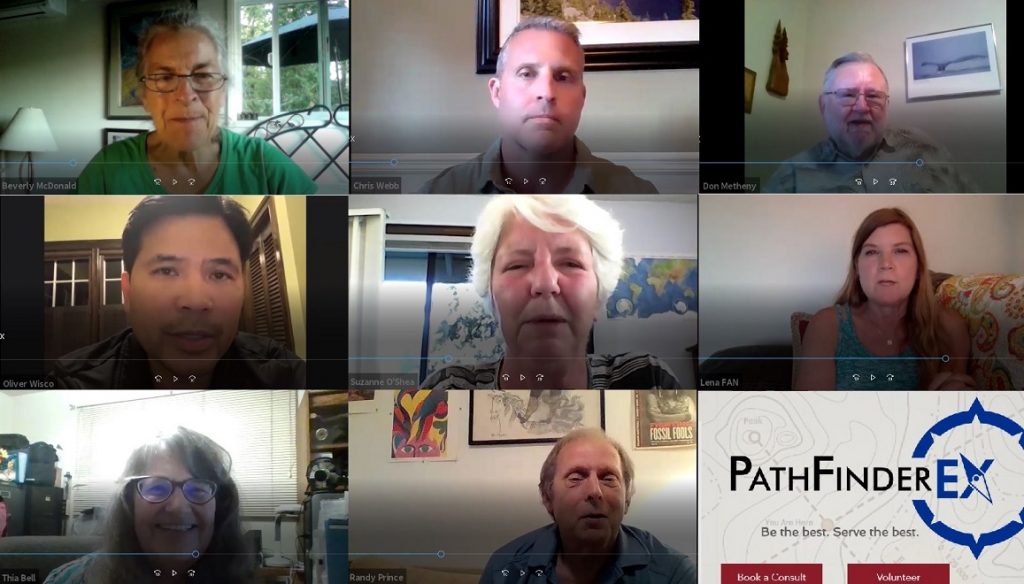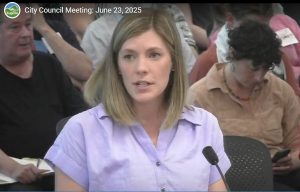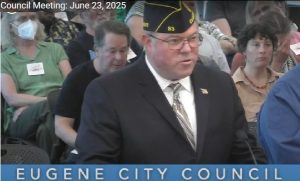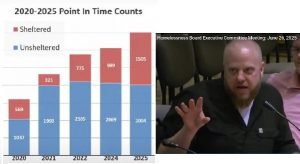Neighborhoods must ‘develop a plan for emergency response’
7 min read
Nearby neighbors will get to practice working together on simulated emergencies, with the Bend non-profit Pathfinder EX.
Chris Webb: Let’s face it, we’re heading for a bad emergency here in Oregon and one in which it’s going to leave our communities basically stranded without any professional support, potentially for quite some time. And so it’s going to be up to the neighborhood associations to form some cohesive, organized entity and develop a plan for emergency response.
[00:00:21] John Q: Chris lives in Eugene’s South Hills, and is with a Bend non-profit. PathfinderEX offers preparedness training.
[00:00:29] Chris Webb: We don’t simply give PowerPoint presentations. We don’t simply read off of handouts. We’re more of a hands-on organization, an organization that provides a bit of training and then a lot of collaboration with the people who are attending the event. And then we like to practice what messages we try to get across with regards to emergency response. We believe that there’s no better way to impart education to people than to teach us a bit and then just do the stuff.
[00:00:55] John Q: Planning with the Neighborhood Leadership Council started about a year ago.
Thank you for supporting
local citizen journalism
[00:00:59] Chris Webb: We are very, very excited to partner with the Eugene Neighborhood Leadership Council. We met Don Metheny and David Monk early on, months and months ago, gosh, I don’t know, probably the better part of 10 months ago, maybe a year ago. I would guess. It’s been very collaborative between the Neighborhood Leadership Council and PathfinderEX, it’s something that Don and David have invested in lots of their time and effort in as well. So we’re bringing this to you, not as a nonprofit entity just coming in bursting on the scene in Eugene. It’s, this is organically grown here in Eugene, and I’m a Eugenean as well, I live in the South Hills. I’m just delighted to be doing this in Eugene, with my community.
[00:01:36] John Q: They hope to draw those not already involved in preparedness.
[00:01:40] Chris Webb: The target audience isn’t the people who already know emergency response, it’s not the CERT teams and it’s certainly not the first responders in our community. The target audience for this are the neighborhoods members, the people who are plumbers, the people who are retired, the people who have administrative jobs, people who don’t necessarily have any known skillsets in, when it comes to emergency response, because it’s never been a part of their life. And so those are the people that we really hope to reach and build those foundational skills that allow you to deal with emergency situations not just as individuals, but in order to take care of your families and also to form communities within your neighborhoods.
[00:02:21] John Q: Chris said they talk about three basic fundamental principles.
[00:02:25] Chris Webb: We’re going to talk about neighborhood response team basics, how to form and organize in the event that there is an emergency in your community and you’re cutoff from those, professional, organic assets. And how to develop a game plan, how to divvy out responsibilities in an organized fashion, how to report back and keep information flowing within the organization.
The second part will be a neighborhood survey. How to divide up your forces. And coming up with a cohesive plan to comb the neighborhood, doing a kind of a initial reconnaissance scan. And then, develop ways to divide your neighborhoods up into organized sectors and know within those sectors what your weaknesses are, what your needs are, who the community is in your neighborhood that needs to be taken care of, and you can communicate that back to your leadership structure and keep track of those sectors.
And then the last part is going to be a neighborhood communication. Just how does the information flow with all of this? What’s the best way to organize communication flow. What’s the best way to utilize assets such as ham radios to report information up, what kinds of information should be reported up? What kinds of information should you keep track of? What kinds of information do you need to know on a need to know basis versus on a regular keeping track of it sort of basis?
And then we’ll put those skills to use. It’s more of a quick learning and then go-do-this-stuff sort of style.
[00:03:48] John Q: By organizing now, the community can become more resilient.
[00:03:52] Chris Webb: It’s amazing what can be done if you just do a little organization and develop some structure ahead of time. If you can organize your human resources in such a way that they’re being utilized efficiently and effectively , you can get so much more work done than if people are simply doing what they think is best.
[00:04:15] Oliver Wisco: I agree completely with Chris. And I think he touches upon probably the most important piece in terms of knowing how to organize yourself and bring yourself to a position in which when higher level entities can come in and help, but more importantly, organizing yourself so that you can do immediate response on your own for a period of time. In the events that there’s a bad mass casualty, a huge event, the reality is the neighborhoods are going to have to be able to fend for themselves for a little while. And we really wanted to be in a position that we can empower or help empower the neighborhoods to be able to take care of themselves. And also realizing that those community members also have some skills and sets of people that can then also do a lot of the groundwork prior to the larger entities coming in and assisting.
It’s a great opportunity to start putting this into action, so that the community is ready when the event happens. Because the reality is it’s not if, it’s just when. And so this is an exciting opportunity. I think Chris outlined perfectly, if we could just get people to recognize how, or understand how to organize and how to take accountability or have a better understanding of what their community members need when the emergency hits, I think that’s a huge step forward.
[00:05:40] John Q: FEMA and many other countries use I.C.S., the Incident Command System. But the organization can also be less formal, such as Eugene’s “ICS for Hippies,” also known as ICS Coordination Support (ICS).
[00:05:54] Oliver Wisco: It doesn’t have to be as formal as a real Incident Command System. But, just, you know, initiating some degree of a system of organization and system in which you’re organizing, utilizing your resources, in which you can account for all your resources, and then you can determine what the needs are and match those up with resources.
[00:06:13] Randy Prince: Bev McDonald. Do you want to introduce who you are and where you’re from.
[00:06:16] Bev McDonald: My name is Bev McDonald and I’m a member of the SHiNA neighborhood. I have a question, Oliver, are you familiar with the Map Your Neighborhood program? And if so, how does what you’re going to be presenting differ, or is it similar to Map Your Neighborhood?
[00:06:38] Oliver Wisco: Map Your Neighborhood, which essentially gives you the capability of having some understanding of what’s available, where people are at and really takes geospatial analysis component to giving data to the emergency planners, I think is a really good concept for the perspective of how you get information in a streamlined fashion and in an organized fashion to the people that need to know that information. But the data itself is only valuable when you know how to use it. And so this type of training essentially takes that concept as a Map Your Neighborhood which essentially goes into the needs assessment piece, goes into understanding some of the different components of your neighborhood, but we take it to the next level of, okay, when the event happens, how do you use that information in an organized manner? And that’s where Chris was going with the Incident Command System and teaching that concept at the neighborhood level.
[00:07:35] John Q: The neighborhoods have also prepared discussion-based exercises known as tabletops. These lead to more complex exercises, connecting neighbors with other responders.
[00:07:49] Don Metheny: I’d like to see this continue year after year and get everyone involved. And I know locally, many of the neighborhoods are getting more and more people involved. And I think this will be a great introduction to some people and help us think about, how do we organize not only down to the neighborhood level, but how do we organize our organizations that we already have in place?
[00:08:19] John Q: The program will include annual large-scale exercises, evaluated by local emergency managers. Awards for the “Eugene Resiliency Games” honor neighborhood preparedness efforts.



